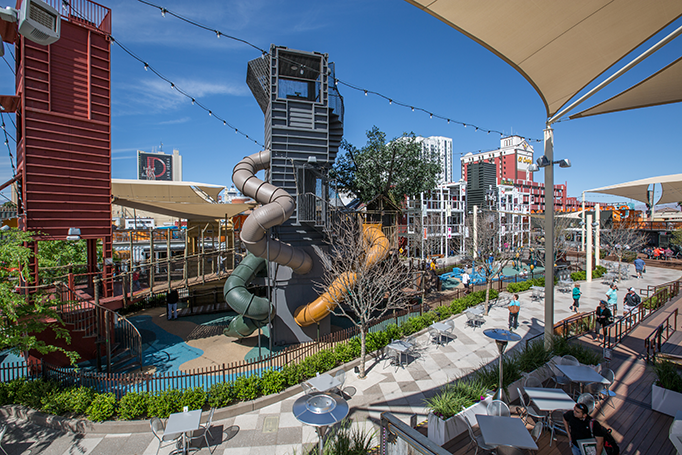More than a few entrepreneurs have professed to think outside the box, but Zappos.com CEO Tony Hsieh took the notion a step further with his Downtown Container Park, a shopping-and-entertainment venue in downtown Las Vegas. This open-air center, which opened in November 2013, is actually made from boxes — specifically, from repurposed shipping containers and locally manufactured steel cubes. The project is just one element of Hsieh’s years-long, $350 million effort to revitalize the Las Vegas core. Downtown was once the epicenter of the city’s casino and hotel industries, but over time the emergence of the nearby Strip siphoned away money and visitors.
Two months before Downtown Container Park’s opening, Zappos, one of the world’s largest online shoe-and-clothing retailers, moved its headquarters from an office park in Henderson, Nev., to downtown Las Vegas. This kick-started Hsieh’s personal campaign to turn the city’s blighted core into an economic and cultural hub. Through an entity called Downtown Project, Hsieh and a few other investors have acquired roughly $250 million worth of real estate, mostly along historic Freemont Street, and undertaken several ventures, including Downtown Container Park. The center, which has 38 independently operated shops, restaurants and bars, occupies half a city block along Freemont, in a part of downtown that was once desolate. The site once housed an abandoned motel.
In less than three years, Downtown Container Park has become a magnet for locals and tourists alike, having drawn upwards of 3 million visitors since it opened. Hsieh’s vision was to create an oasis for families, who would rarely venture downtown not long ago. Families can play and dine together at the center, which boasts seven restaurants and bars, including a barbecue joint, a craft-whiskey cocktail bar and an authentic Mexican-food restaurant specializing in tacos. Many of the eateries and bars have both indoor and outdoor seating.
“Three years ago there were no mothers with strollers in downtown Las Vegas,” said Michael Downs, executive vice president of operations for Downtown Project. “Today downtown is definitely a more family-oriented destination than it once was.”
A robust entertainment offering has also helped the center find its footing. Free concerts, movies and similar events take place on the center’s main stage. Quarterly wine-tasting events and beer festivals are often sold out, says Downs. There are no national chains to be found at Downtown Container Park. The center is intended to be a starting place for promising entrepreneurs who have longed to open a shop or restaurant but have been hard-pressed to afford a typical shopping center or street location, he says.
The entry-level rent at Downtown Container park is just $1,000 per month for a 250-square-foot space on the center’s third level. Leases span just six months, which allows tenants to cut losses should the concept fail. The short-term leases also help keep the center’s merchandise mix fresh. Tenants are required to put down only one month’s rent as a security deposit, and the only store build-out costs are those associated with the purchase of fixtures. Tenants also have creative license when it comes to deciding how to outfit their spaces and decorate their windows. Merchants create their own signage and pick out their own paint colors and display racks. “Each store is artsy and has its own feel and experience,” said Downs. “It is a very organic atmosphere.” — Anna Robaton
